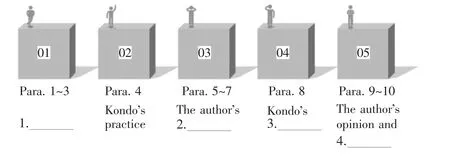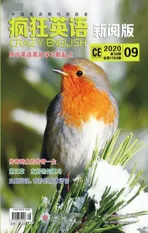What we gain from keeping books我们从藏书中获得了什么
2020-10-09江苏南菁高级中学
江苏南菁高级中学 王 蓉
Step 1 感知·阅读导航
话 题 导 入
Marie Kondo(近藤麻理惠) 是日本的“整理达人”,代表作有《怦然心动的人生整理魔法》。 2019年起,她在美国Netflix上推出自己的真人秀节目。在节目中,这位以独特整理方法闻名的日本整理大师说如果一个东西能够在你触碰的一瞬间带给你愉快的感觉,那这件东西就是值得保留的,反之则可以丢弃。这样的建议是否也适用于书籍?看看本文对麻理惠做法的评价,如果是你,你会因为没有怦然心动的感觉,而丢弃你的藏书吗?
全文约740词,建议用时13分钟。
阅读目标
1. 梳理文章结构,识别作者的观点、态度并给出理由。
2. 对语篇进行宏观和微观分析,把握语篇逻辑。
3. 辩证地看待作者的观点,形成自己独立的观点。
4. 以读促写,读写结合,思考在当下保护书籍和读书的意义。
难词探意
1. territory /΄terətri/ n. 领土;领域
2. invalid /ɪn΄vælɪd/ adj. 无充分事实的;站不住脚的
3. episode /΄epɪsəʊd/ n. (电视连续剧或无线电
The latest TV series by charming, tidy-up expert Marie Kondo has landed on Netflix.While we are all in love with the energetic folk featured in her show, last week I accidentally entered the territory of disagreeing with Kondo's philosophy—in a tweet that went viral. For a while I'd pay attention to Kondo's “KonMari Method” for habits such as folding T-shirts. She广播剧的)一集
4. narrative /΄nærətɪv/ n. 故事
5. diversion /daɪ΄vзː∫n/ n. 转移;偏离is entirely misguided when she says we should get rid of books that don't give us “joy”.
“Do NOT listen to Marie Kondo or KonMari in relation to books. Fill your apartment and world with them. I don't give a shit if you throw out your knickers and Tupperware but the woman is so badly misguided about BOOKS. Every human needs an extensive library instead of clean, boring shelves,” I tweeted.
The present figures among the 25,000-plus tweets replying to mine are as follows: 65%a gree with me, 20% disagree and 3% think we are fighting over a football team; the rest insist I am joyless. But be assured that this joyless person will not follow Kondo's advice to essentially hold my books and see if they inspire joy.
In one video, Kondo helps a woman remove her books by “waking them up”. Surely the way to wake up any book is to open it up and read it aloud, but not to tap it with fairy finger motions—but this is the nonsense territory we are in. Once the books are split into “keep and getgone” piles, Kondo and the woman thank the books for serving their purpose.
This is deeply problematic when applied to books. The definition of joy for the many people yelling at me on Twitter is: “A feeling of great pleasure and happiness or a thing that causes joy, success or satisfaction.” This is a ridiculous suggestion for books. Literature does not exist only to inspire feelings of happiness or to comfort us with its pleasure; art should also challenge us.
We live in a goal-obsessed time. Everything undertaken has to have a purpose, outcome or a destination, or it's invalid. But art doesn't care about your Apple Watch, your fitness goals, active lifestyle or career. Art will be around far longer than Kondo's books remain in print. Art exists on its own terms and untidy timeline.
As for removing one's unread books—while that may be essential for reducing fire and tripping hazards, it is certainly not a satisfying engagement with the possibilities of literature (Unless they are about self-help or golf, in which case, toss them.). Success is, eventually, actually reading your unread books, or at least holding on to them long enough so that they have the chance to satisfy, dissatisfy or trouble you. Unread books are imagined reading futures, not an indication of failure.
In one episode of her Netflix series, Kondo helps two male writers tidy up their very tidy home. When it comes to the books, the advice is frustrating. “Books are a reflection of our thoughts and values,” Kondo says to the viewer.“Will these books be beneficial to your life moving forward?”
More often than not, books reflect someone else's thoughts and values. Most of us don't share the values of Adolf Hitler, but we may own many books about the Second World War.The question of whether my books will be beneficial to my life moving forward requires an a bility I do not possess. Our book collections record the narrative of expansion, diversion,terror and yet-to-be-discovered possibilities of our reading life. This is why, on entering your living space, people immediately migrate to examine your bookshelves, rather than search in your sock drawers.
I read in a variety of ways and never mind donating or sharing books. But I can't imagine what a blank collection of physical books I'd be left with is if they had to inspire joy. When I look at my shelves, I marvel at how random books have ended up beside each other. Some are on my shelf on the strength of just one line or a paragraph. Some are gifts; others I found were deserted in the street. But every purchase of a book is a gesture of faith in the writer who wrote it. Writers are nothing without readers.Rather than follow Kondo's rules, I'd like to suggest another: it should be a must that all living spaces come with built-in bookshelves.
Step 2 理解·文本解读
Ⅰ. Reading for the main idea
1. What's the type of the writing of the article?
2. The passage is mainly intended to__________ .
A. illustrate Kondo's philosophy
B. introduce the benefits of books
C. discuss whether or not to get rid of books
D. argue against the practice of getting rid of books
Ⅱ. Reading for the structure

Ⅲ. Reading for understanding
1. What's Kondo's philosophy?
2. What's the author's attitude towards Kondo's philosophy? What words indicate the author's attitude?
3. What's the author's opinion about dealing with books?
4. How does Kondo help a woman remove her books in Para. 4?
5. What does the author think of Kondo's practice? Why does the author think so?
6. What's Kondo's advice to viewers about books in Para. 8?
7. What does the author think of Kondo's advice about books? Why does the author think so?
8. How does the author argue for her opinion?
9. What's the author's conclusion?
Ⅳ. Reading for critical thinking
1. What do you think of the author's writing?
2. Whose side do you take? Kondo's or the author's? Why?
【点石成金】问题链是一连串由文本知识转化而成的,层次鲜明、具有系统性、相对独立而又相互关联的教学问题。 围绕议论文的体裁、语篇结构和文本主题设置的问题链能够引导学生提取文本信息,转述文本内容,并发展自己的批判性思维。 通过回答understanding部分的问题,学生能够掌握这篇议论文的论点、论据、论证过程,推测作者的情感态度;通过回答critical thinking部分的问题,学生能学会辩证地看待文本内容和作者的情感态度,形成自己独立的观点,并给出合理的理由。
Step 3 运用·读写整合
1. Supposing Marie Kondo wants to help you remove your books, what would you say to her?
2. Nowadays, there are a growing number of people who don't like reading books. Can you analyze the reasons behind it and give suggestions accordingly?
【点石成金】此环节基于文本创设情境,引导学生学以致用。 第一个读写活动与文本紧密相连,保持输入和输出的一致性。 通过文本解读环节的问题链,教师给学生的输入搭建了脚手架,学生在此环节可以抓取原文关键词,转换语言表达,重新构建文本。 第二个读写活动则进行了话题的拓展,发展学生的分析问题、解决问题的能力。
Step 4 提升·素养建构
Ⅰ. 语篇分析
语篇分析包括宏观分析与微观分析。宏观分析是指分析语篇的体裁结构及其表现特征。微观分析主要是分析语篇的衔接。 就宏观分析而言,英语中存在着许多语篇模式,常见的模式只有几种,如问题—解决模式(Problem-Solution pattern)、 概括—具体模式(General-Particular pattern)、主张—反主张模式(Claim-Counterclaim pattern)。 就微观分析而言,衔接包括语法衔接和词汇衔接。 语法衔接通过关联词、替换词、省略词、连词等将句子衔接起来;而词汇衔接则将原词、近义词、反义词、上下义词的复现作为衔接方式。
1. What's the structure pattern of the passage?

2.What logic connective does the author use in this article?
3.What does the underlined word “this”in Para.4 and Para.5 refer to?What's the function of “this”?
4. What lexical coherence(词汇衔接) is used in the article?
【点石成金】此环节旨在引导学生关注议论文的语篇特征。 基于语篇的宏观和微观分析,学生能更好地分析文本、理解文本,把握同类型文体的逻辑。议论文有立论文和驳论文两种。立论文是以论据从正面论证作者的观点;驳论文则是用证据驳倒反方观点或论据,从而证明作者观点的正确性。 本文属于驳论文,也就是主张—反主张语篇模式。
Ⅱ. 视野拓展
《论读书》是《培根随笔》中一篇重要的文章。 《论读书》因其简洁的语言、优美的文笔、透彻的说理、深刻的警句,在世界文学史上占据了非常重要的地位,以下是这篇文章的节选:
Of Studies(excerpt)Francis Bacon王佐良(译)
Studies serve for delight, for ornament, and for ability. Their chief use for delight is in privateness and retiring; for ornament, is in discourse; and for ability, is in the judgment and disposition of business.
读书足以怡情,足以傅彩,足以长才。 其怡情也,最见于独处幽居之时;其傅彩也,最见于高谈阔论之中;其长才也,最见于处世判事之际。
Crafty men contemn studies, simple men admire them, and wise men use them; for they teach not their own use; but that is a wisdom without them, and above them, won by observation.
有一技之长者鄙读书,无知者羡读书,唯明智之士用读书,然书并不以用处告人,用书之智不在书中,而在书外,全凭观察得之。
Reading maketh a full man; conference a ready man; and writing an exact man. And therefore, if a man write little, he had need have a great memory; if he confer little, he had need have a present wit; and if he read little, he had need have much cunning, to seem to know that he doth not.
读书使人充实,讨论使人机智,写作使人严谨。 因此不常写作者须记忆力特强,不常讨论者须天生聪颖,不常读书者须欺世有术,方能无知而显有知。
Histories make men wise; poets, witty; the mathematics, subtle; natural philosophy, deep; moral,grave; logic and rhetoric, able to contend. Abeunt studia in mores. (Studies go to make up a man's character.)
读史使人明智,读诗使人灵秀,数学使人周密,科学使人深刻,伦理学使人庄重,逻辑修辞之学使人善辩;凡有所学,皆成性格。
